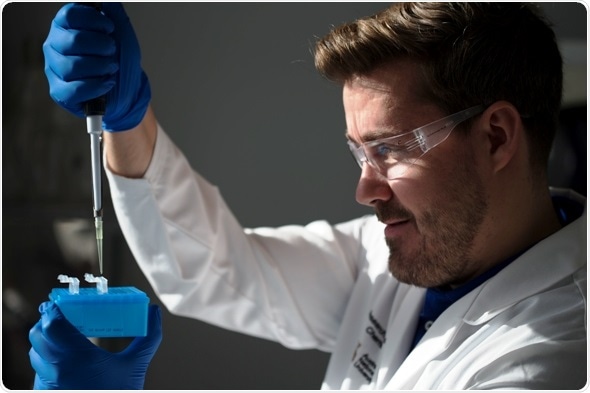Aug 17 2018
A scientist at The Australian National University (ANU) is developing a new just-add-water diagnostic kit for use in remote communities to detect malaria and other diseases.

Dr Lee Alissandratos in his lab at The Australian National University. Image credit: Lannon Harley, ANU
Dr Lee Alissandratos from the ANU Research School of Chemistry said the diagnostic kit, which can be easily transported and stored at room temperature, would be ideal for non-specialists in remote and resource-limited communities.
“Early detection of microorganisms that cause diseases, such as malaria, is critical in the global fight to control and eradicate some of the most devastating diseases around the world,” said Dr Alissandratos, who is a CSIRO Synthetic Biology Future Science Fellow.
“The stability and ease-of-use of our kits means that diagnosis may be carried out close to point-of-care, allowing detection of the disease at the earliest possible stage.”
Diagnostic tests used today to detect the malarial pathogen are expensive and only effective when carried out within well-equipped laboratories operated by highly skilled staff.
“They are not available to resource-limited communities where they are urgently needed,” Dr Alissandratos said.
He has already carried out proof-of-concept diagnostic tests, and he will use a $US100,000 grant awarded by the Bill and Melinda Gates Foundation to develop these into ready-to-use devices.
“Our approach may be easily extended to the detection of almost any pathogen, be it in humans, animals or plants. Therefore, it also has important potential applications in agriculture and farming, particularly in remote parts of Australia,” Dr Alissandratos said.
He has used synthetic biology to engineer a safe microorganism that produces all the biochemical reagents necessary to detect the malarial parasite.
“These reagents are extracted at very low cost to produce a working, user-friendly diagnostic test, which replaces the need for multiple, expensive and unstable reagents, as well as complex protocols relying on specialized equipment and highly trained technicians,” Dr Alissandratos said.
“By using synthetic biology we are able to generate all the components necessary through a simple method akin to a fermentation – a biochemical process commonly employed for the production of many foods and medicines.”
Dr Alissandratos expects to have the first “just-add-water” test kits ready within 18 months, when the Bill and Melinda Gates Foundation will consider providing a further $US1 million to enable application of the kits in clinical settings in the developing world.
ANU Acting Vice-Chancellor Professor Mike Calford congratulated Dr Alissandratos on his work to develop a medical diagnostic kit for remote communities.
"By providing remote communities with access to early disease diagnosis, this work has the potential to change the lives of millions globally. On behalf of the University, I congratulate Lee on this funding which will help him continue his vital research,” Professor Calford said.